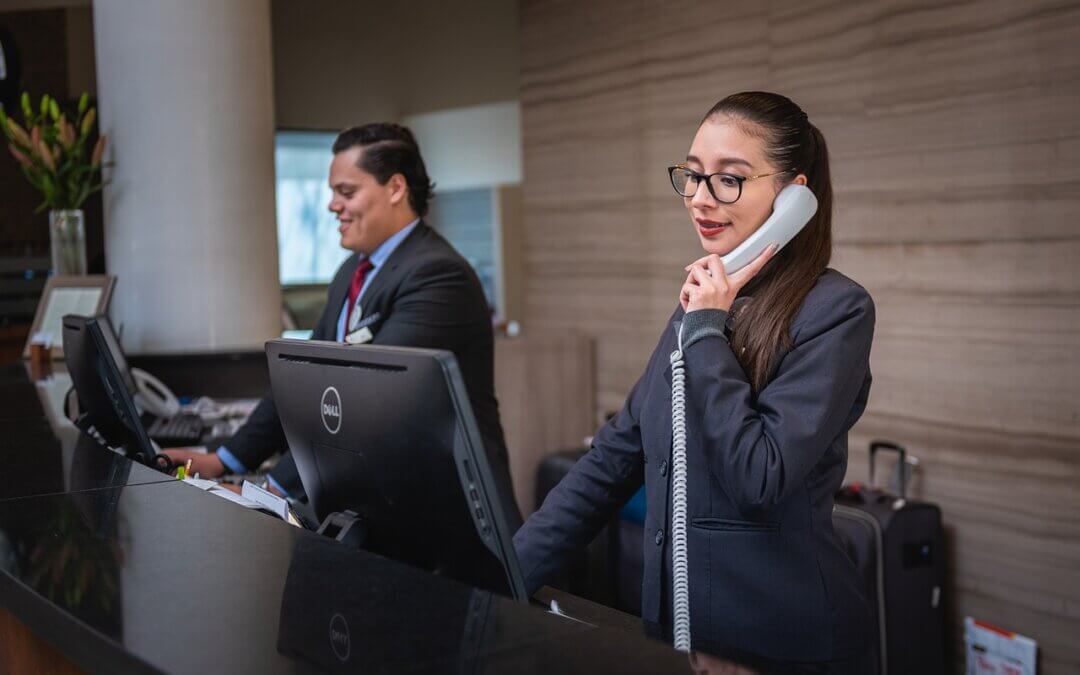
by Jana Johnson | Mar 18, 2025 | Sales
The hospitality industry is often characterized by fluctuating demand, with certain months experiencing a lull in bookings. However, slow periods don’t have to mean reduced profits.
By implementing strategic initiatives, hotels can maximize their revenue even during off-peak months. Here are some effective strategies to consider:
In the hospitality sector, fluctuations in guest bookings are a common challenge. However, off-peak months need not equate to diminished profitability. By implementing strategic initiatives, hotels can effectively capitalize on these quieter periods.
Here are key strategies to optimize revenue during low-demand months
- Diversify Service Offerings
Expanding the range of services can attract a broader clientele. Consider hosting corporate events, workshops, or themed weekends to draw in diverse groups. Collaborate with local businesses to offer comprehensive packages that include dining, tours, or wellness services. This approach not only attracts guests but also enhances their overall experience, fostering repeat business.
- Implement Dynamic Pricing Models
Adopting a flexible pricing strategy is essential in maintaining occupancy rates. During off-peak periods, consider offering competitive discounts or special rates to attract cost-conscious travelers. Bundling accommodations with additional services can provide added value, encouraging bookings.
- Enhance Marketing Initiatives
Targeted marketing campaigns are crucial in boosting visibility during slow months. Utilize digital platforms to reach a wider audience and engage potential guests. Highlight unique aspects of your hotel, such as its location, amenities, or special events. Collaborating with influencers or industry partners can further amplify your reach.
- Strengthen Customer Loyalty Programs
Building strong relationships with past guests can lead to increased bookings. Implement a loyalty program that rewards repeat visits with exclusive benefits. Personalized communication, such as tailored offers or updates, can enhance guest engagement and encourage return visits.
- Leverage Technological Advancements
Investing in technology can streamline operations and improve guest experiences. Implement a user-friendly booking system to facilitate reservations. Offering virtual tours or online concierge services can enhance the booking process. Additionally, utilizing data analytics can help identify trends and tailor marketing efforts to target specific demographics.
- Establish Local Partnerships
Collaborating with local attractions or businesses can create mutually beneficial relationships. Offer packages that include access to nearby events or experiences, providing guests with a comprehensive stay. Partnering with local restaurants or shops can also enhance the guest experience and encourage exploration of the area.
- Invest in Staff Development
 Well-trained staff are integral to delivering exceptional service. During slower periods, focus on staff training to improve service quality and efficiency. Empower employees to provide personalized service and address guest needs promptly. A positive guest experience can lead to favorable reviews and referrals, boosting future bookings.
Well-trained staff are integral to delivering exceptional service. During slower periods, focus on staff training to improve service quality and efficiency. Empower employees to provide personalized service and address guest needs promptly. A positive guest experience can lead to favorable reviews and referrals, boosting future bookings.
Conclusion
Maximizing profits during off-peak months requires a strategic approach and proactive planning. By diversifying service offerings, implementing dynamic pricing, enhancing marketing initiatives, strengthening customer loyalty programs, leveraging technology, establishing local partnerships, and investing in staff development, hotels can maintain profitability and ensure long-term success.
Embracing these strategies can transform slow periods into opportunities for growth and innovation.

by Jana Johnson | Jan 28, 2025 | Marketing, Sales
The ultimate guide to attracting and catering to small groups at your hotel is here.
Attracting small groups to your hotel can be a lucrative strategy, as these groups often seek personalized experiences and can become repeat customers.
Types of groups to attract to your hotel
- Corporate Retreats: These groups are looking for a mix of business and leisure. They need meeting spaces, team-building activities, and relaxation options.
- Family Reunions: Families seek comfortable accommodations and activities that cater to all ages.
- Wedding Parties: Couples and their guests need event spaces, catering, and accommodation.
- Sports Teams: Require group accommodations, meal plans, and proximity to sports facilities.
- Educational Tours: Schools and educational groups look for learning opportunities and safe environments.
Focus on two group types
When booking groups for a hotel, it’s important to consider the diversity of group types to maximize occupancy and revenue. By selecting groups that have different booking timeframes, hotels can avoid competition for the same dates, ensuring a more balanced and profitable schedule. This strategy not only optimizes room availability but also enhances guest satisfaction by catering to a wider range of needs and preferences.
Corporate Retreats
Corporate retreats are an excellent opportunity for hotels to showcase their meeting facilities and team-building activities. These groups often require conference rooms, catering services, and leisure activities. Offering packages that include local excursions, spa treatments, and gourmet dining can make your hotel an attractive choice. Highlight any unique features your hotel offers, such as scenic views or historical significance, to add value to their stay.
Family Reunions
Family reunions are another group type that hotels can attract. These groups typically look for comfortable accommodations, family-friendly activities, and dining options that cater to all ages. Consider offering family packages that include discounts on local attractions, access to kid-friendly amenities, and group dining options. Creating a welcoming atmosphere with personalized services can enhance their experience and encourage repeat visits.
Group Types with Existing Traction
If your hotel already has traction with corporate retreats, leverage this by enhancing your meeting facilities and offering tailored packages that include team-building activities and local excursions. Consider gathering testimonials from past corporate clients to build credibility and showcase your expertise in hosting successful retreats. Networking with local businesses and offering referral discounts can also help in attracting more corporate groups.
Hotel Capacity
Understanding your hotel’s capacity is crucial. Ensure you have enough rooms and meeting spaces to accommodate small groups without compromising the experience of other guests. Consider flexible room configurations and multi-purpose spaces that can be adapted to different group sizes and needs. Highlight your hotel’s ability to host both intimate gatherings and larger events, ensuring potential clients that you can cater to their specific requirements.
Wi-Fi Infrastructure
Reliable Wi-Fi is a must-have for any group, especially corporate retreats. Ensure your hotel has robust Wi-Fi infrastructure that can handle multiple devices and high bandwidth usage. Consider offering dedicated networks for groups to ensure seamless connectivity. Highlight your hotel’s technological capabilities in your marketing materials, emphasizing the ease of conducting virtual meetings and presentations.
Building Long-Term Relationships
Building long-term relationships with small groups can lead to repeat business. Offer loyalty programs, personalized services, and follow-up communications to keep your hotel top-of-mind for future events. Consider sending personalized thank-you notes or small gifts post-stay to show appreciation. Regularly update your clients on new offerings or improvements at your hotel, inviting them to return for future events.
Become a Preferred Destination for Small Groups in Your Market
By focusing on these strategies, your hotel can become a preferred destination for small groups, leading to increased bookings and customer loyalty. Tailoring your services to meet the specific needs of different group types can set your hotel apart from competitors and create memorable experiences for your guests.
Ready to attract more small groups to your hotel? Contact GRANT Hospitality to get started.

by Jana Johnson | Dec 23, 2024 | General Manager, Sales
In the bustling world of hospitality, keeping hotel guests happy and coming back is key to success.
But sometimes, things don’t go as planned, and hotels might see guests choosing to stay elsewhere. Let’s dive into some common reasons why guests might say goodbye and explore how hotels can turn things around to keep those smiles and bookings coming.
Poor Customer Service
The initial interaction with hotel staff sets the tone for the entire guest experience. Consistently excellent customer services foster trust and loyalty. Guests who feel valued and well-cared-for are more likely to return and recommend the hotel to others. Solution: Create a culture that prioritizes guest satisfaction at every level. Encourage staff to go above and beyond to meet guest needs and exceed expectations. Empower staff to make decisions and take actions that enhance the guest experience. Invest in regular training for staff to ensure they provide exceptional service consistently.
Lack of Cleanliness
Cleanliness is a non-negotiable aspect for guests, often one of the top factors influencing guest satisfaction. A lack of cleanliness can severely impact a hotel’s reputation and its ability to retain customers. Solution: Implement strict cleaning protocols and conduct regular inspections of all areas of the hotel, including guest rooms and common areas. Use high-quality cleaning products and equipment to ensure effective cleaning and consider eco-friendly options that are safe for both guests and the environment.
Outdated Facilities
Today’s travelers expect modern, comfortable, and aesthetically pleasing environments. Outdated facilities can lead to disappointment, negatively affecting the overall guest experience and reducing the likelihood of repeat visits. Guests are more likely to choose hotels that offer the latest amenities and smart room features, and modern fitness centers. Solution: Regularly update facilities and amenities to meet current standards and guest expectations and communicate these changes to potential and returning guests through marketing channels and online planforms.
Inconsistent Quality
In the hospitality industry, consistency in service and quality is key to building trust and loyalty among guests. Inconsistencies, whether in-room cleanliness, service delivery, or amenities can lead to disappointment and dissatisfaction. Solution: Standardize procedures and conduct regular quality checks to ensure consistency across all services. Provide comprehensive training for all employees to ensure they understand and adhere to the hotel’s standards. Regular training updates can help maintain consistency and address any gaps in knowledge.
High Prices Without Value
Guests who feel they did not receive value for their money are less likely to become repeat customers, impacting long-term customer retention. High prices without corresponding value can drive customers to competitors. Solution: Regularly assess the competitive landscape to understand how your pricing compares to similar hotels. Consider implementing dynamic pricing strategies that adjust rates based on demand, seasonality, and guest preferences.
Poor Online Presence
In today’s digital age, a strong online presence is essential. Without it, hotels struggle to reach potential guests who primarily search for accommodations online. Negative reviews or a lack of engagement with online reviews can lead to a negative perception of the hotel. Solution: Actively manage online reviews and maintain an engaging and informative online presence. Also utilize social media platforms to engage with gusts, share updates, and promote special offers. Create engaging content that showcases the hotel’s unique features. And don’t forget to regularly update online listings on third-party booking sites.
Limited Amenities
Guests often look for specific amenities such as Wi-Fi, fitness centers, dining options, or spas. A lack of options can lead to disappointment and dissatisfaction. Solution: Conduct surveys and gather feedback to understand what amenities guests value most. Use this information to prioritize investments in amenities that will have the greatest impact on guest satisfaction. Another idea is to collaborate with local businesses to offer guests access to additional amenities and experience such as gym memberships, spa treatments, or off-site dining experiences.
Inflexible Policies
In a market where many hotels offer flexible options, those with strict policies. May lose out to competitors who provide more accommodating terms, especially in unforeseen circumstances. Solution: Regularly review and revised policies and see where flexibility can be increased. Implement a fair cancellation policy that balances the hotel’s need to manage occupancy with guests’ needs for flexibility. Consider offering free cancellations within a certain timeframe.
Failure to Address Complaints
Complaints provide valuable insights into areas where the hotel can improve. Ignoring guest complaints means missing opportunities to enhance the guest experience and operational efficiency. Guests who have unresolved issues are less likely to become repeat customers and retaining customers is often more cost-effective than acquiring new ones. Solution: Implement a robust system for addressing and resolving complaints promptly and effectively. Also, encourage staff to listen actively to guest complains and show empathy.
Conclusion
In the world of hospitality, great customer service is like the secret ingredient that keeps guests coming back for more. By investing in staff training, creating a guest-first culture, and using the addressing complaints, hotels can really amp up their service game. When guests feel valued and cared for, they’re more likely to spread the word and return for future stays. So, let’s make exceptional customer service the heart of every guest experience – because happy guests are the best guests!

by Jana Johnson | Oct 8, 2024 | Sales
RFP Season for Hotels
It’s that time of year again – RFP season for hotels. This is when companies send out requests for proposals to secure business for the upcoming year. It’s a crucial period to lock in negotiated rates and to make sure your hotel is included in a company’s hotel program.
What is an RFP?
A hotel RFP (Request for Proposal) is a document that a company or organization sends to hotels to gather information about their services, pricing, and availability for an event, group stay or negotiated rate for a specific time period. The RFP typically includes details like:
- Hotel information
- Hotel amenities and services
- Standard rates
- Negotiated rates
Hotels respond with proposals outlining how they can meet the requirements, along with pricing and terms. This helps the organization compare options and choose the best fit for their needs.
RFP Platforms
When managing hotel RFPs (Request for Proposals), using the right platforms can streamline the process and ensure you get the best deals. Cvent is a popular option for cloud-based technology.
Cvent is a comprehensive event management platform that offers tools for sourcing venues, managing RFPs, and tracking responses. It’s widely used in the hospitality industry.
RFP Responses
Most RFP platforms let you create templates and pull profile information, making it easier to answer common questions.
Filling in details and submitting your bid is just the start. Here’s what you need to do:
- Gather information to help make this a smooth process.
- Include your hotel details like address, phone number, sales contact, property photos, distance from the airport, transportation options, meeting spaces, guest rooms, amenities, and more.
- Include all requested information.
- You can offer extra options to make your proposal more enticing.
- Add additional detail under “Comments” that help sell your hotel.
- A client may add custom question fields. Give this area special consideration because they may be dealbreakers for the client.
- Load rates as soon as possible upon acceptance to prevent booking gaps for accounts.
- Ensure RFPs are completed within the timelines provided by the agency.
Key Points to Remember
- Deadline: Make sure to submit your proposals on time. Missing a deadline can mean losing out on significant business.
- Customization: Tailor each proposal to the specific needs of the hotel. Highlight how your services can meet their unique requirements.
- Competitive Pricing: Offer competitive rates but ensure they are sustainable for your business and based on the forecasted production per the company.
- Follow-Up: After submitting the proposal, follow up to show your interest and answer any questions they might have.
If your RFP is successful and approved, the client will send you rate loading instructions. Typically, contracts are finalized prior to the end of the year to avoid issues and keep the booking process smooth.

by Jana Johnson | Aug 26, 2024 | Sales
Unlocking the Potential of Your Hotel’s Meeting Space
In the bustling world of hospitality, standing out from the competition is paramount. For hoteliers, one untapped avenue for revenue and reputation enhancement is their meeting space. But how does one transform these areas into sought-after venues for conferences, seminars, and corporate gatherings? This blog post will guide you through the process of effectively marketing and selling your hotel’s meeting space and to maximize its potential.
Crafting a Unique Selling Proposition
First impressions count. Start by identifying what makes your meeting space unique. Is it the state-of-the-art technology, the inspiring views, or the customizable catering options? Pinpoint these distinctive features and weave them into a compelling narrative. Remember, your goal is to create an experience, not just offer a room.
Leveraging Digital Marketing Strategies
The digital realm is your oyster when it comes to marketing. Optimize your hotel’s website with dedicated pages for your meeting spaces, complete with virtual tours and testimonials. Dive into the world of SEO by incorporating keywords such as “premium meeting spaces,” “business conference venues,” or “corporate event hosting” to climb the search engine ranks.
Building Partnerships and Networks
Don’t overlook the power of partnerships. Partnerships with local businesses and event planners can extend your reach and bring in new clientele who trust the recommendations of these partners. Forge relationships with local businesses and event planners; they can become ambassadors for your space. Offer incentives for repeat bookings or referrals to create a network that markets for you. It’s a great way to build credibility and fill your event calendar.
Utilizing Social Media Platforms
Social media is not just for vacation snaps; it’s a business tool. Showcase your meeting spaces in action on platforms like Instagram and LinkedIn. Use hashtags, live videos, and stories to engage potential clients and give them a taste of what you can offer.
Encouraging Reviews and Testimonials
Word-of-mouth still reigns supreme. Encourage satisfied customers to leave reviews on platforms like Google My Business and TripAdvisor. Positive experiences shared by real users are incredibly persuasive to prospective clients.
Offering Tailored Meeting Room Packages
One size does not fit all in the world of meetings and events. Create flexible package deals that cater to various needs and budgets. Whether it’s a small team-building session or a large-scale trade show, having tailored options will appeal to a broader audience.
Hosting Showcase Events
Let your space speak for itself by hosting showcase events. Invite local businesses, event planners, and the press to experience your facilities firsthand. A successful event can lead to immediate bookings and long-term relationships.
Measuring Success and Adapting
Finally, track your marketing efforts. Use analytics to understand what’s working and what isn’t. Be ready to adapt and refine your strategies based on real data. Continuous improvement is key to staying ahead in the competitive hotel industry.
Conclusion: Marketing Plan for Meeting Rooms
Marketing your hotel’s meeting space effectively requires creativity, strategy, and persistence. By highlighting your unique offerings, embracing digital marketing, building networks, engaging on social media, and fostering positive customer experiences, you can elevate your space to become a premier destination for events. Remember, it’s about creating memorable experiences that resonate with clients long after the meeting has ended.

by Jana Johnson | Jun 27, 2024 | Sales
In the bustling world of hospitality, standing out from the crowd is paramount.
Crafting Your Hotel’s Unique Selling Proposition
As a new hotel owner, your first step is to carve out a unique selling proposition (USP) that distinguishes your establishment from the rest. Is it the bespoke concierge service, the fusion cuisine at your in-house restaurant, or perhaps the tech-savvy rooms tailored for the modern traveler? Pinpoint what makes your hotel a cut above the rest and let that drive your sales narrative.
Understanding Your Market Segment
Who are you inviting into the cozy embrace of your hotel? Families seeking adventure, business travelers looking for efficiency, or couples on a romantic getaway? Grasping the nuances of your target market segment allows you to tailor your marketing efforts effectively. Dive deep into their preferences, peak travel times, and booking habits. Remember, a well-aimed arrow hits the mark.
Digital Marketing: Your Online Presence
The digital realm is non-negotiable territory. Ensure your website is not just a digital brochure but a portal that encapsulates the essence of your hospitality. Invest in search engine optimization (SEO) to climb the ranks in search results. Engage with guests through social media platforms—showcase your hotel’s ambiance, share glowing testimonials, and create shareable content that resonates with your audience.
Building Relationships with Booking Agents and Travel Platforms
It’s not what you know, but who you know. Forge strong relationships with booking agents and online travel agencies (OTAs). They can catapult your visibility to potential guests far and wide. Offer competitive rates, provide them with high-quality images and detailed information about your property, and keep communication lines open. A symbiotic relationship with these gatekeepers can be a goldmine for referrals and bookings.
Leveraging Customer Feedback for Growth
Listen up; your guests have something to say. Customer feedback is a treasure trove of insights. Encourage reviews and take the time to respond to them, whether they sing praises or offer constructive criticism. Use this feedback to refine your services and rectify any shortcomings. A hotel that grows and improves based on its guests’ experiences is a hotel that understands the heartbeat of its business.
Training Your Team for Excellence
Your staff are the ambassadors of your brand. Equip your team with the training and tools they need to deliver exceptional service. From the front desk to housekeeping, every interaction is an opportunity to make a lasting impression. When your staff excels, they not only enhance guest experience but also become instrumental in driving repeat business and word-of-mouth recommendations.
Conclusion: The Journey to Success
Embarking on the journey as a new hotel owner is thrilling yet daunting. Remember, the foundation of hotel sales lies in understanding your unique value, knowing your audience, embracing the digital landscape, nurturing industry relationships, valuing customer feedback, and fostering a culture of excellence among your team. With these strategies in place, you’re well on your way to writing your own success story in the world of hospitality.

 Well-trained staff are integral to delivering exceptional service. During slower periods, focus on staff training to improve service quality and efficiency. Empower employees to provide personalized service and address guest needs promptly. A positive guest experience can lead to favorable reviews and referrals, boosting future bookings.
Well-trained staff are integral to delivering exceptional service. During slower periods, focus on staff training to improve service quality and efficiency. Empower employees to provide personalized service and address guest needs promptly. A positive guest experience can lead to favorable reviews and referrals, boosting future bookings.



